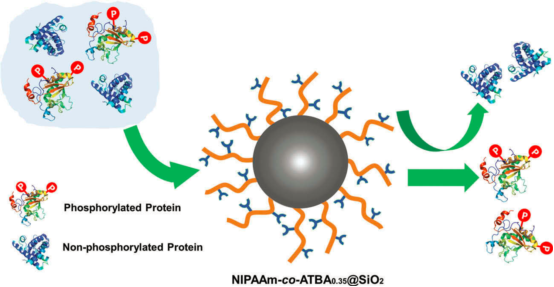Separation of phosphoproteins is essential for understanding their vital roles in biological processes and pathology. Transition metal-based receptors and antibodies, the routinely used materials for phosphoproteins enrichment, both suffer from low sensitivity, low recovery and coverage. In this work, a novel smart copolymer material was synthesized by modifying porous silica gel with a poly[(N-isopropylacrylamide-co-4-(3-acryloylthioureido)benzoic acid)0.35] (denoted as PNI-co-ATBA0.35@SiO2). Driven by the hydrogen bonds complexation of ATBA monomers with phosphate groups, the copolymer-modified surface exhibited a remarkable adsorption toward native alpha-casein (a model phosphoprotein), accompanied with significant changes in surface viscoelasticity and roughness. Moreover, this adsorption was tunable and critically dependent on the polarity of carrier solvent. Benefiting from these features, selective enrichment of phosphoprotein was obtained using PNI-co-ATBA0.35@SiO2 under a dispersive solid-phase extraction (dSPE) mode. This result displays a good potential of smart polymeric materials in phosphoprotein enrichment, which may facilitate top-down phosphoproteomics studies.
Smart polymers driven by multiple and tunable hydrogen bonds for intact phosphoprotein enrichment
Xiaofei Zhang, Qi Lu, Cheng Chen, Xiuling Li,* Guangyan Qing,* Taolei Sun, and Xinmiao Liang*
Science and Technology of Advanced Materials, 2019, 20, 858-869.
DOI: 10.1080/14686996.2019.1643259
